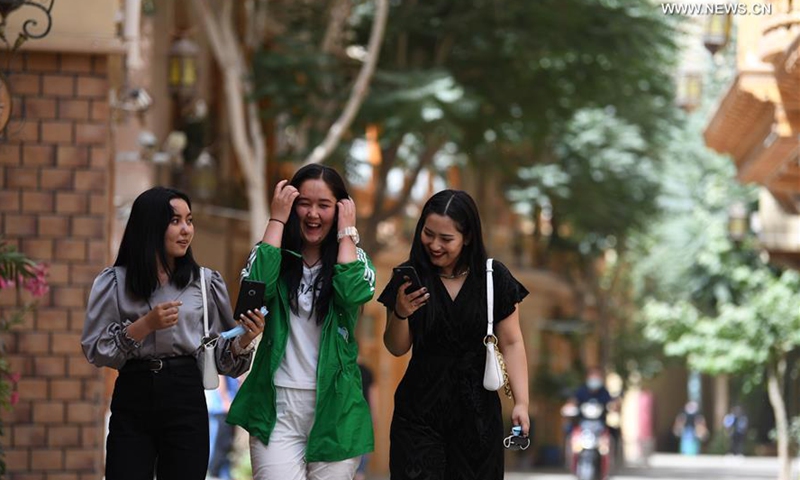Security installed at request of Muslims against terrorism: Xinjiang official
Source: Global Times Published: 2020/7/17 23:03:40

People walk in the "Dove Lane" in the old town Tuancheng of Hotan City, northwest China's Xinjiang Uygur Autonomous Region, May 26, 2020. Gezixiang, meaning "Dove Lane", inside the old town Tuancheng in Hotan City, used to be a place for people to trade doves. After four years of renovation, the lane was turned into a tourist attraction with family inns and stores selling local signature products. The renovation project of this old town in Hotan is still in progress, aiming to build this place into a historical block that attract tourists with its distinctive characteristics and culture.Photo:Xinhua
As requested by local Muslims, Northwest China's Xinjiang Uygur Autonomous Region installed security facilities to protect believers, as a big number of violent terrorist attacks had been launched at religious sites around the world in recent years, a Xinjiang official said at a press conference on Friday.
According to the 2019 Report on International Religious Freedom of the US State Department, religious venues in Xinjiang like Id Kah Mosque of Kashi were installed with walk-through metal detectors and surveillance cameras to "monitor" the Muslims' religious activities.
Mehmut Wusman, director of the Xinjiang Regional Ethnic Affairs Commission, refuted the accusation and said that when the three evil forces - separatism, terrorism and extremism - hit Xinjiang, many religious figures were brutally killed.
For instance, on July 30, 2014, 74-year-old Juma Tayir, vice president of the Xinjiang Islamic Association and senior mullah of the Id Kah Mosque in Kashi, was killed by three terrorists after presiding over morning prayers.
To protect the lives of religion personnel and believers, we have installed necessary security facilities in religious places in accordance with a request from local clerics and believers, the official said.
The move is widely welcomed, and is not for "monitoring the Muslims' religious activities" as the 2019 Report on International Religious Freedom called it, Mehmut said.
The official also noted that in recent years, a number of violent terrorist attacks had been launched at religious sites around the world. As a result, many countries have installed security facilities in their religious sites, including surveillance cameras.
"I believe that these measures are aimed at protecting Muslims, and will not affect normal religious activities. As far as I know, some religious venues in the US have also installed surveillance cameras. So are you doing this to monitor the people's religious activities?" the official asked.